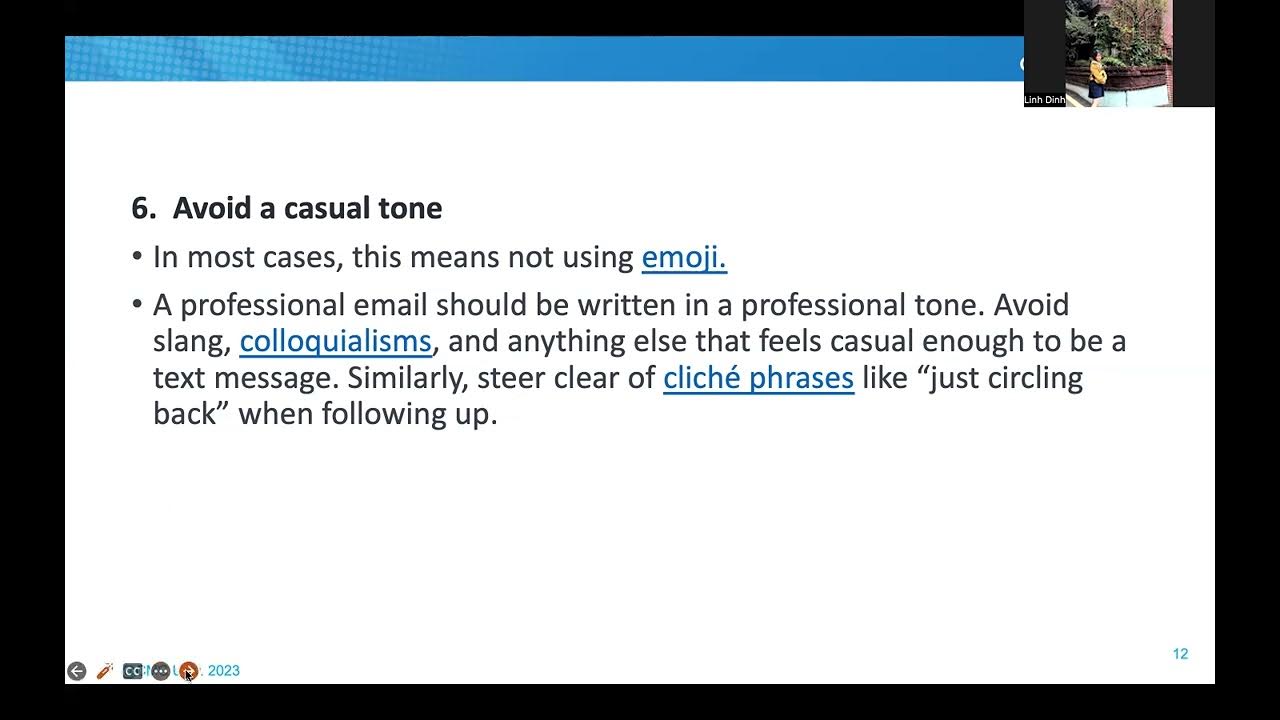How to Write an Email Professionally? Business Email Writing Tips With Examples
Summary
TLDRThis video provides a detailed guide on writing formal emails, emphasizing the importance of structure, tone, and language. It outlines key components such as subject lines, salutations, opening and closing sentences, body content, and signature formats. The video offers practical tips for both formal and informal communication, highlighting when to use formal language in professional contexts, such as emailing clients or management. The viewer is also encouraged to be mindful of cultural nuances, ensuring emails are appropriate for the recipient and the situation.
Takeaways
- 😀 A clear and concise subject line is essential to grab the recipient's attention and indicate the purpose of the email.
- 😀 Use formal salutations like 'Dear Mr./Ms. [Last Name]' when addressing someone professionally, especially in business communications.
- 😀 Start your email with a polite and professional opening sentence to set a positive tone, such as 'I hope this email finds you well.'
- 😀 Keep the body of the email clear, direct, and free from unnecessary filler. Break up the content into short paragraphs for better readability.
- 😀 Use bullet points or numbered lists when conveying multiple points or tasks to ensure clarity and ease of understanding.
- 😀 Always close the email with a courteous closing line, such as 'I look forward to hearing from you.'
- 😀 A professional email signature should include your full name, job title, and company name, along with any other relevant contact information.
- 😀 If addressing a group, use a generic salutation such as 'Dear Team' instead of addressing individuals.
- 😀 When writing formal emails, avoid casual language and tone. Ensure the language remains professional throughout.
- 😀 Be mindful of the level of formality in your email depending on the recipient's position or the nature of the communication.
- 😀 To enhance professionalism, always use correct grammar and punctuation in every part of the email, from subject line to signature.
Q & A
Why is the subject line important in a formal email?
-The subject line is crucial because it gives the recipient a preview of the email's purpose. A clear and direct subject line helps the recipient understand the content at a glance and decide whether to open the email.
What is the appropriate salutation when emailing someone in authority?
-When emailing someone in authority, you should use a formal salutation, such as 'Dear Mr. [Last Name]' or 'Dear Ms. [Last Name].' This shows respect and professionalism.
Can you use informal language in a business email?
-No, using informal language in a business email can appear unprofessional. Always stick to formal language, especially when communicating with clients, superiors, or business partners.
What are some examples of polite opening sentences in formal emails?
-Some examples of polite opening sentences are 'I hope this email finds you well,' or 'Thank you for your prompt response.' These lines set a respectful tone for the email.
How should you structure the body of your email?
-The body of the email should be clear, concise, and organized. Start by introducing the purpose of the email, provide any necessary details, and keep paragraphs short to maintain readability.
What is the significance of the closing sentence in an email?
-The closing sentence indicates the end of the message and leaves a positive impression. Phrases like 'I look forward to hearing from you' or 'Please let me know if you need any further information' show professionalism and prompt further communication.
What are some formal email sign-off options?
-Formal email sign-offs include phrases like 'Best regards,' 'Sincerely,' or 'Kind regards.' These are polite and professional ways to close an email.
Why is it important to include a signature in your email?
-A signature provides the recipient with your full name, position, and company, which ensures they know who you are and how to contact you if necessary.
What should be included in an email signature?
-An email signature should include your full name, job title, company name, and contact information (if applicable). It adds a professional touch to your communication.
What is the best way to close a formal email when you're expecting a response?
-A good closing sentence when expecting a response could be 'I look forward to your response' or 'I look forward to meeting you next Monday.' This conveys that you anticipate further communication.
Outlines

This section is available to paid users only. Please upgrade to access this part.
Upgrade NowMindmap

This section is available to paid users only. Please upgrade to access this part.
Upgrade NowKeywords

This section is available to paid users only. Please upgrade to access this part.
Upgrade NowHighlights

This section is available to paid users only. Please upgrade to access this part.
Upgrade NowTranscripts

This section is available to paid users only. Please upgrade to access this part.
Upgrade NowBrowse More Related Video

Formal versus Informal Emails: Email Writing Tips for Business English

How to write an Email in English: FORMAL & INFORMAL - Real Life English Conversation

The Formal Email - Everything you need to know!

HOW TO WRITE A FORMAL LETTER / EMAIL IN ENGLISH | CAMBRIDGE EXAM WRITING STRUCTURE

(LEVEL 6-EPS 2): WRITING SKILLS: Formal email

How to write a business report | | UPV
5.0 / 5 (0 votes)